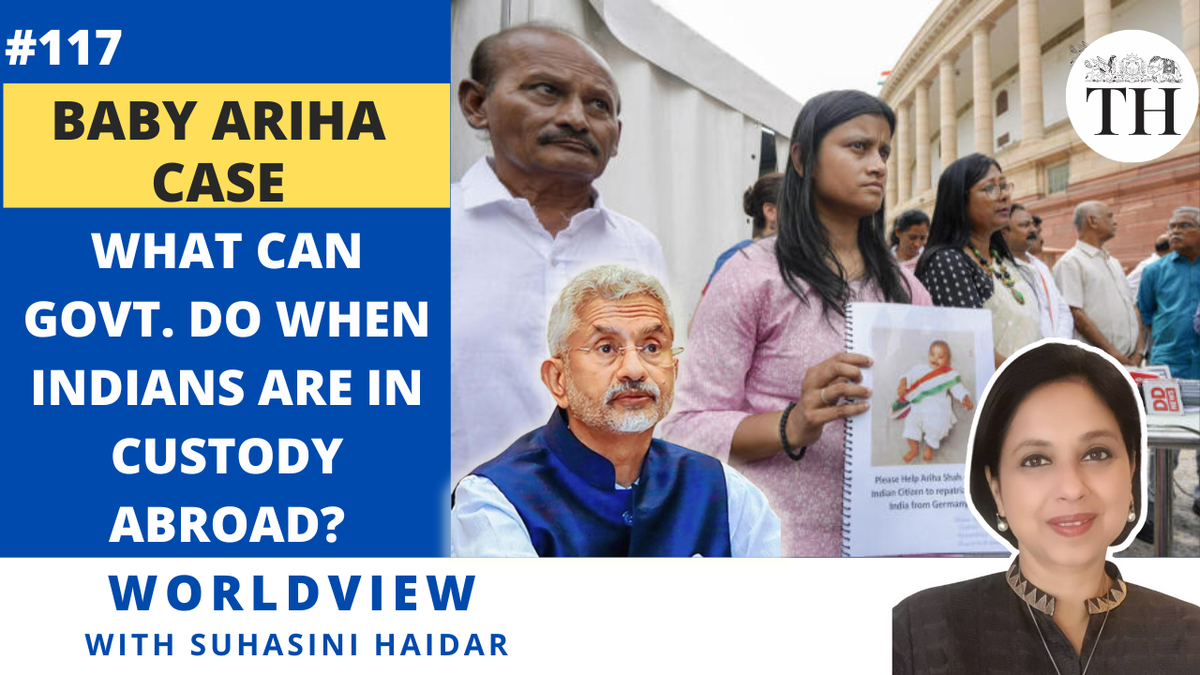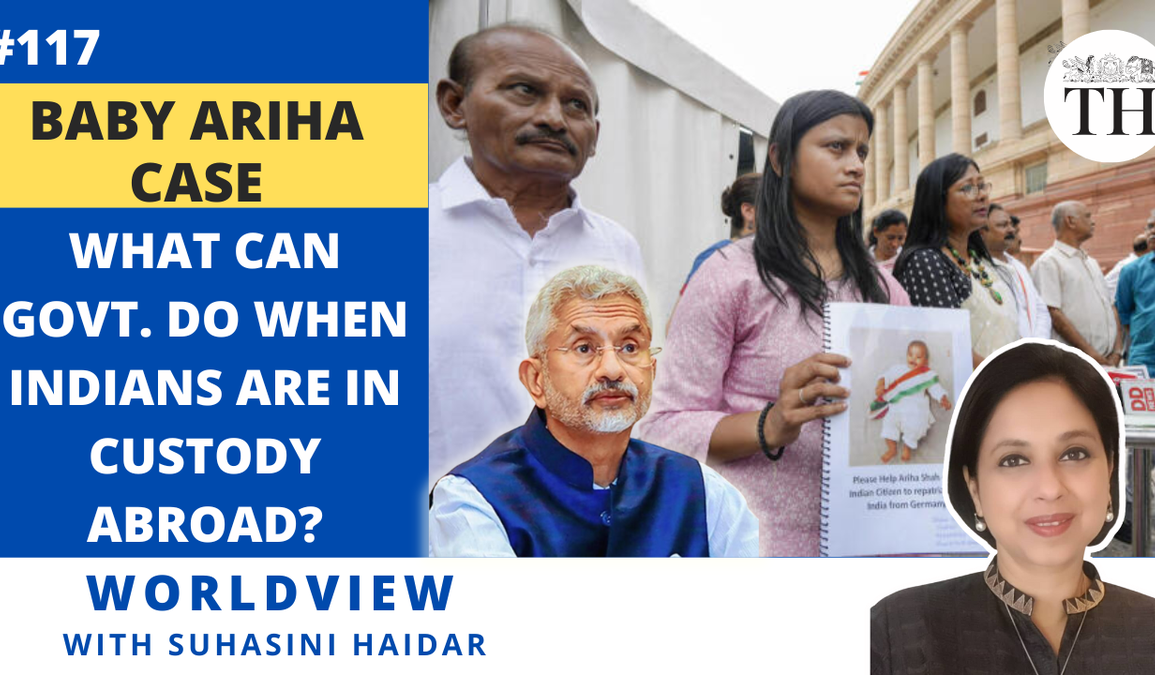
Two years after an Indian baby was taken from her parents by German Youth Services after allegations of abuse, the government is taking political heat, with the opposition calling for her return to India. What are the government’s diplomatic options when Indians are kept in custody of different kinds abroad?
This week, we are looking closer at one part of consular diplomacy. We have in previous WVs spoken about bringing home Indians during conflicts abroad. This time we are looking how the Ministry of External Affairs and Indian Embassies abroad have to deal with the cases of Indians kept in custody in Foreign lands- not all of them are “innocents abroad”, but the government is bound to help all its citizens to return.
This week, it is a 2 year old child Ariha Shah who was in the spotlight, as MPs demanded the government take up the case, and the MEA summoned the German Ambassador to demand that the child, who has been at a foster home since September 2021, be returned to India.
About 60 MPs across party lines also wrote to the German Ambassador over the issue.
Let’s just tell you a bit about the case:
– In September 2021, German Youth Services, known as Jugendamt took Ariha Shah, then 7 months old away from her parents Dhara and Bhavesh Shah who were living in Berlin. A hospital had documented injuries on the baby of what it suspected was physical abuse, and alerted child services. The Shahs, who denied any abuse, said the injuries were accidental, returned to India to start a campaign for the child to be returned
– In December 2022, EAM S. Jaishankar brought up the case during his meeting with German FM Annalena Baerbock.
Jaishankar: A specific issue, which came up, some of you may be familiar with this case, this relates to a child called Ariha Shah. So, we have concerns that the child should be in her linguistic, religious, cultural and social environment. This is her right. And our embassy is pursuing the matter with German authorities, but it was also subject which I had brought up with the Minister.
Here’s what the German Foreign Minister said in response:
Baerbock: Children are only taken in custody by the youth office, if there are serious concerns about their wellbeing, for example, violent sexual abuse, or severe neglect. So, as has been said, by my distinguished colleague, it is about privacy rights as well so we cannot say more at this point. The case is still pending in court and after the verdict of course, there can be a review, but for us what is most important the first priority is the wellbeing of the child.
In June this year, the Court gave that verdict against the parents- and gave the full guardianship of the baby, now 2 and a half years old to Youth services, which means that she would be brought up in a foster home until she is an adult. The verdict is now being appealed by the parents- but given the severity of the injuries and charges, this is going to be an uphill task.
So what are the Government’s options
1. The government could stay out of the case, help the parents in their appeal, but allow the German legal system to take its course.
2. The government could escalate the matter and make it a diplomatic issue, and after summoning the Ambassador, could then proceed to freeze other bilateral ties.
In the past we have seen ties frozen in two high profile cases:
Denmark: After it refused to extradite a Danish Pilot Kim Davy who had admitted to flying the plane that dropped a massive tranche of weapons in Purulia, the government froze all high level contact from 2010-2016, and also stopped the Ambassador’s meetings with officials in Delhi.
Italian Marines: After Two Italian marines were arrested for killing Indian fishermen off the Kerala coast in 2012, ties between India and Italy were frozen for several years as the governments negotiated, and then Italy took the case to the International Court of Justice, where India lost. It is understood that Italy even voted against India at multilateral fora like the MTCR in 2014 over the case
Norway children: In the case of the Chakrabortys whose children were taken from them by Norway’s child services over allegations of abuse- after pressure from India, Norway’s government agreed to transfer their custody to the extended family of the children.
3. Take it up at the highest levels: Remember, German Chancellor Olaf Scholz will be in Delhi in September for the G20 summit, and MPs have asked PM Modi to take the case up, although it is unclear if it was taken up when Scholz last visited Delhi in February
4. Take it to an international court- as the Italian government did with the marines case
5. The government could negotiate with the German government and Youth Services, to ensure the child’s custody is transferred to a foster home in India, with oversight by German authorities, as the government did in 2012 with Norway.
This case is obviously in the headlines- but everyday the MEA and Indian diplomats are working on such consular issues, trying to ensure the well-being of Indians in other countries, particularly those who have been taken into custody for a number of reasons.
1. Trespassing- like fishermen- who are arrested in Pakistan, and also Iran. India and Pakistan have an agreement to exchange lists of all prisoners and fishermen from the other country- As of July ,there were 343 civilian prisoners and 74 fishermen believed to be Pakistani, in Indian custody. Pakistan has shared lists of 42 civilian prisoners and 266 fishermen believed to be Indian
2. Illegal immigrants and those accused of crimes in country- According to the latest figures given by the MEA, there are at present 8,330 Indians in Foreign prisons, over about 90 countries- the largest numbers are in Gulf countries, where the largest number of Indian NRIs live and work. https://mea.gov.in/Images/CPV/ru869_01.pdf
3. Those accused of spying for India- these include two current cases:
i) Qatar spying case: 8 retired Indian naval officers have been in Qatari prison since August 2022, accused of spying. The government has so far been unable to make any headway in bringing them home, but diplomatic channels working on it
ii) Jadhav in Pakistan: In 2016, Pakistan arrested Kulbhushan Jadhav, a retired Naval officer based in Iran, claiming he was spying for India in Balochistan- who has been awarded the death sentence. India holds he was kidnapped, went to the ICJ and won a case over the validity of the martial court that sentenced him, but has made little headway on having him released
Last month I asked EAM Jaishankar about efforts for both cases, and the possibility of a spy swap
“Suhasini your question about Kulbhushan Jadhav and the Qatar case. They’re very different cases, first of all…Now your question, will there be any diplomacy around it? Look, I never ruled that out, even as a general proposition. Because as I said, a large part of our outlook today is really, if Indian citizens are in difficulties of any kind. And these are two very exceptional situations. I would say it is in the DNA of this Government that we should do whatever we can, whether they are Indian students, which was your question, or Indian military officers, or just anybody else, or people in the Gulf who often face charges.”
iii) Ansari in Pakistan: One happy ending was that of a civilian Hamid Ansari was in Pakistani custody for 6 years, after he was convicted for trespassing illegally and spying. He was released in 2018 after completing a short sentence- and after interventions by human rights activists.
4. Terrorist cases: Finally, there is the singular case of the group from Kerala who joined ISIS in Afghanistan in 2016- while the men died, 4 women, including one who had a child there were kept in custody. Although Indian officials spoke to them in 2019, the government never decided if they would bring them back- and in 2021, when the Taliban took over, the women went missing.
5. Indians abroad wanted for crimes in India: Extradition cases including Nirav Modi, Mehul Choksi and Vijay Mallya- We dealt with this in a previous edition of WorldView
Finally, what can diplomats do to assist Indians in custody abroad?
1. Consular assistance, help families meet with imprisoned Indians. The MEA runs a website called MADAD, and has an Indian Community Welfare Fund (ICWF) that is used for such cases
2. Negotiate for the Indians through diplomat channels
3. Legal assistance, panel of lawyers to take up cases, including ICJ
4. Travel assistance for those who complete sentences
5. India has also signed agreements for Transfer of Sentenced Persons, so they can serve their sentences with India.
-Bilateral agreements with 31 countries.
-Inter-American convention on transfers
-Council of Europe convention on transfers
6. Prisoner Swaps- exchange of prisoners of each others countries, as is done for fishermen. US and Russia also did this for Spies.
WV Take:
Eventually all Indian citizens from an innocent child like Baby Ariha to those accused of serious crimes including former naval officers in prison in Qatar and Pakistan— are the responsibility of the Indian government. Bringing them home must be a consistent effort with sustained diplomacy, and when necessary, compromises and give and take by diplomats and the MEA.
WV Reading Recommendations:
1. Hamid: The Story Of My Captivity, Survival and Freedom by Hamid Ansari and journalist Geeta Mohan
2.The Journey Of A Mother by Sagarika Chakraborty- also the subject of the film Mrs. Chatterjee vs Norway
3. Contested Coastlines: Fisherfolk, Nations and Borders in South Asia by Charu Gupta and Mukul Sharma
4. India vs UK: The Story of an Unprecedented Diplomatic Win by Syed Akbaruddin- the story of how an Indian Judge was installed at the ICJ- he played a major role in the Jadhav case
Several books on spy swaps:
5. SPY SWAP: The Humiliation of Putin’s Intelligence Services by Nigel West
6. Spy Stories Cathy Scott Clark and Adrian Levy- who call themselves the Gavrilov Channel, referring to Russia-US spy swap communications- but between India and Pakistan
7. Bridge Of Spies by Giles Whitell
Books on fugitives
8. FLAWED by Pavan Lall- on Niirav Modi
9. Kingfizzer: The Rise and Fall of Vijay Mallya by Kingshuk Nag
10. Escaped: True Stories of Indian Fugitives in London by Danish Khan and Ruhi Khan
Script and Presentation: Suhasini Haidar
Production: Gayatri Menon and Reenu Cyriac
This post was originally published on this site be sure to check out more of their content.








COMMents
SHARE
Email